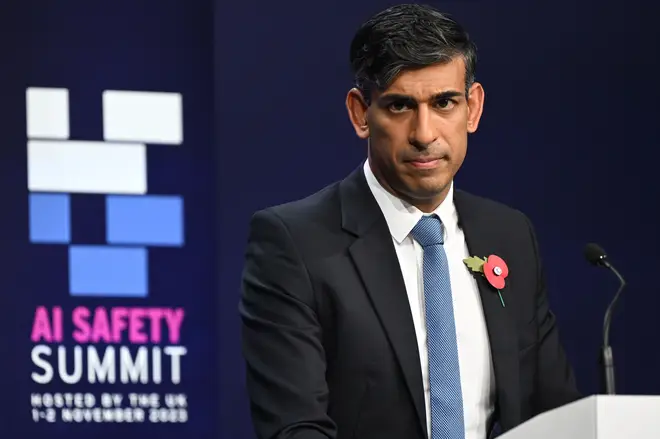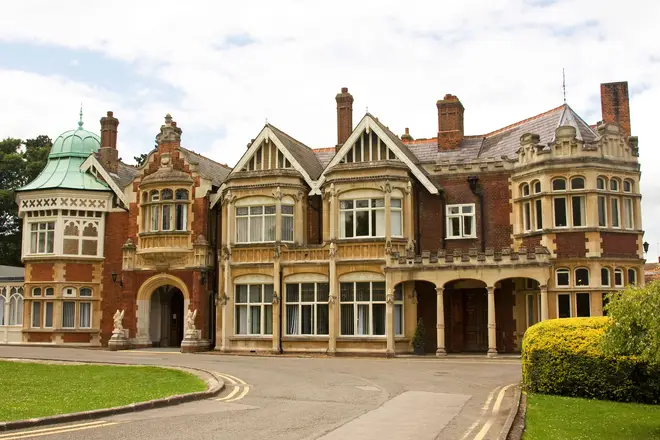
Richard Spurr 1am - 4am
2 November 2023, 17:01

Rishi Sunak has said that artificial intelligence should be seen as a "co-pilot", as he acknowledged anxieties that the technology could overwhelm the jobs market.
Speaking at the end of a two-day AI safety summit at Bletchley Park in Milton Keynes, the Prime Minister said that AI should be seen as a tool that will help people with their jobs.
The conference has been attended by entrepreneurs, ministers from governments around the world, and technology theorists, who are discussing the potential risks of AI.
Twenty-eight countries, including the US and China, have signed the Bletchley Declaration, an agreement for a a shared understanding of the opportunities and risks posed by frontier AI". The agreement also sets out the need for "governments to work together to meet the most significant challenges" it poses".
Elon Musk, one of the event attendees, said that AI poses an existential threat to humanity.

Sunak says AI risks could be on similar scale to pandemics and nuclear war
But Mr Sunak, who will speak to the Tesla founder later on Friday, said that AI should be soon as a tool, not necessarily as a threat.
"I know this is an anxiety that people have," the Prime Minister told a press conference at Bletchley Park on Thursday afternoon.
"We should look at AI much more as a co-pilot than something that necessarily is going to replace someone's job.
"AI is a tool that can help almost everybody do their jobs better, faster, quicker, and that's how we're already seeing it being deployed."

He added: "I'm of the view that technology like AI which enhances productivity over time is beneficial for an economy. It makes things cheaper, it makes the economy more productive. But that doesn't mean jobs can change."
He said people should not be worried because "because we're developing the education and skills system that we need to ensure everyone can flourish over the years and decades to come".
The Prime Minister said: "The lesson is that we need to move quickly and that's what we're doing.
"The technology is developing at such a pace that governments have to make sure that we can keep up.

The King delivers a virtual address at AI Safety Summit
"Now, before you start mandating things and legislating for things I think A) by the way that takes time and we need to move faster, and we are, but secondly you need to know exactly what you're legislating for and that's why our safety institute is so important.
"So far we've got the co-operation we need, but, of course, I think everyone would acknowledge, ultimately, binding requirements will likely be necessary, but it's important that we do those in the right way and that needs to be based on empirical evidence that we'll get from our testing."
Mr Sunak added that the summit would "tip the balance in favour of humanity".
He told the press conference: "While this was only the beginning of the conversation, I believe the achievements of this summit will tip the balance in favour of humanity, because they show that we have both the political will and the capability to control this technology, and secure its benefits for the long term."

Michelle Donelan on the AI Safety Summit
US Vice President Kamala Harris was among the global leaders in attendance at the event, alongside Musk and other tech firms including Amazon, Google, Meta and Microsoft.
Mr Sunak said there would be a series of international AI safety summits, with France and Korea agreeing to host further summits next year.
He added: "The late Stephen Hawking once said 'AI is likely to be the best or worst thing to happen to humanity'. If we can sustain the collaboration we've fostered over these last two days, I profoundly believe that we can make it the best.
"Because safely harnessing this technology could eclipse anything we've ever known.

"If, in time, history proves that today we began to seize that prize, then we will have written a new chapter worthy of its place in the story of Bletchley Park and, more importantly, bequeathed an extraordinary legacy of hope and opportunity for our children and generations to come."
The mood about the future of AI has been mixed among attendees.
Mr Musk told attendees on Wednesday: "I think AI is one of the biggest threats [to humans].
"We have for the first time the situation where we have something that is going to be far smarter than the smartest human.
"We're not stronger or faster than other creatures, but we are more intelligent, and here we are for the first time, really in human history, with something that is going to be far more intelligent than us.
"It's not clear to me if we can control such a thing, but I think we can aspire to guide it in a direction that's beneficial to humanity.
"But I do think it's one of the existential risks that we face and it is potentially the most pressing one if you look at the timescale and rate of advancement - the summit is timely, and I applaud the Prime Minister for holding it."

King Charles, who also attended the event, warned that AI risks need to be addressed with "urgency, unity and collective strength" as it continues to rapidly evolve.
But Meta communications chief Sir Nick Clegg warned against heavy-handed regulation.
The former Liberal Democrat deputy Prime Minister said that threats about the end of civilisation were overblown, but said governments needed to co-operate on tackling risks to elections from AI-created disinformation like deepfakes.